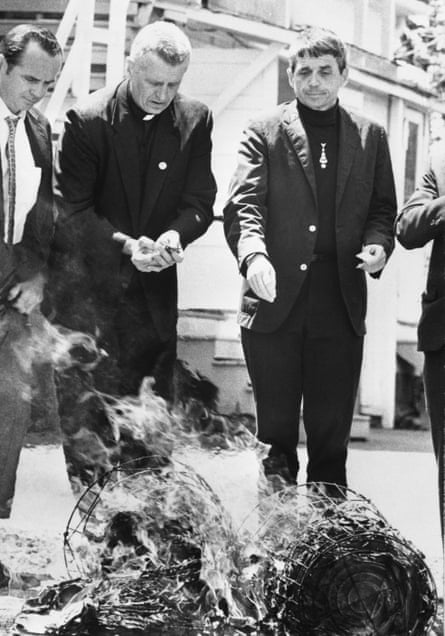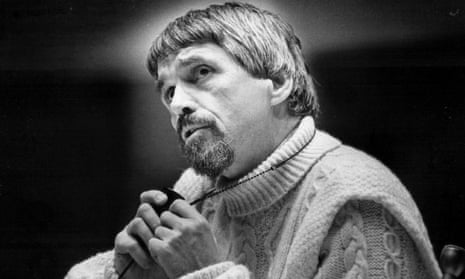The American Jesuit priest Father Daniel Berrigan, who has died aged 94, formed a radical partnership with his younger brother, Philip, that energised the movement against the Vietnam war in the 1960s and created a tradition of pacifist activism that lasted a generation. Unlike Philip, a former Josephite who gave up the priesthood and married an ex-nun, Daniel remained in holy orders as a Jesuit thinker, writer and teacher, and a well-regarded poet. If Philip was the heart of the anti-war movement, Daniel’s intellectual and theological contributions made him the brains.
He made consistent denunciations of the “war-making sins” of the state, while a strong strain of philosophical anarchism caused him to rage against what he called “American military imperialism”. His detractors, many from within the Catholic church’s liberal wing, maintained that his teachings alienated as many as they recruited. Berrigan, in one of several well-known aphorisms, retorted that “a good peace movement starts out small and gets smaller”.
His activism brought him far less time in prison than Philip’s total of nearly 11 years. They both became famous in the same demonstration when, with seven others, they publicly burned Vietnam draft records in May 1968 at a recruitment station in Catonsville, Maryland, and were arrested, convicted and sentenced to jail terms (Daniel’s was three years). The Trial of the Catonsville Nine became the title of a play by Daniel performed off-Broadway in 1971, by which time he and Philip had made the cover of Time magazine. The play was made into a film, produced by Gregory Peck, in 1972.
Earlier in 1968, Daniel had flown with the activist Howard Zinn to Hanoi to secure the release of three American pilots, and experienced bombing raids on the north Vietnam capital carried out by the US Air Force. This episode led to his book Night Flight to Hanoi: War Diary with 11 Poems, published that December. He also visited South Africa, the Soviet Union and Central America in the cause of radical politics. One of his earliest expeditions had been to Selma, Alabama, the site of civil rights protests, in 1964.

Berrigan wrote more than 50 books, some of them co-authored, and including numerous volumes of poetry. Among his theological works were treatises on Old Testament prophets including Ezekiel, Isaiah and his namesake, Daniel, whom he portrayed as the rebel who said “no” to wrongful authority, and whose life was an unmistakable allegory of his own. He also had a knack for pithy sayings and is credited with the remark, “Don’t just do something, stand there” – a 60s reminder of the need for political thought as well as action.
He was born in Virginia, Minnesota, the fifth of six children of German and Irish Catholics, Frida and Thomas Berrigan. Thomas was a railwayman and socialist who later moved the family to New York state, where he founded the Electrical Workers’ Union. Daniel entered a Jesuit seminary as a teenager and, after the end of the second world war, taught French and Latin at a New Jersey school until 1949. He spent some time in France and studied Buddhism before being ordained as a priest in 1952.
In 1957 he published his first book of poems, Time Without Number, as well as becoming a professor of theology at Le Moyne College, Syracuse. He left in 1962 to become assistant editor of Jesuit Missions in New York city until 1966, when he was appointed associate director of United Religious Work at Cornell University. But although he regarded himself as a devout Catholic, his pacificism pitted him against some other Jesuits and particularly the bishops, who never directly supported the pacifist activities of either Berrigan brother.
After being sentenced for his part in the protests at Catonsville, Daniel disappeared for four months, during which he topped the FBI’s “Most Wanted” list. He was re-arrested on Block Island, off the coast of Rhode Island, in August 1970, at the home of a friend. Although he was apprehended scores of times, his next threat of a long sentence came in 1981 when he received five-to-10 years for joining a protest at a General Electric site in which he and others (the “Plowshares Eight”) took hammers to nuclear warhead casings. The sentence was eventually overturned.
In his later years his health kept him away from some protests, but he was arrested for his part in a demonstration at a naval museum in New York in 2006, and gave his support to the Occupy Wall Street movement. He continued to write and to teach at Fordham, the Jesuit university in New York city, and he never diluted his opposition to warmongering.
Philip died in 2002.

Comments (…)
Sign in or create your Guardian account to join the discussion